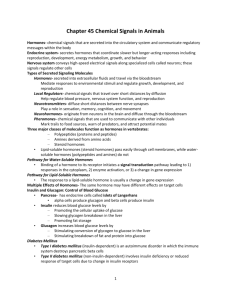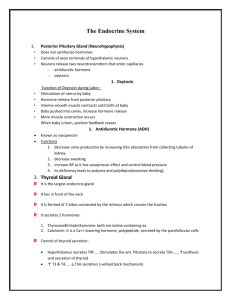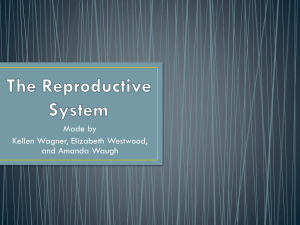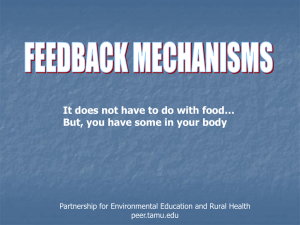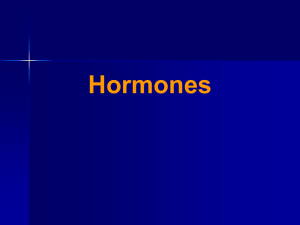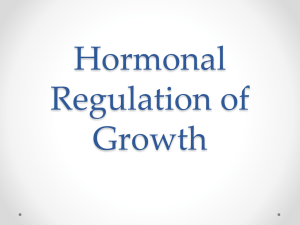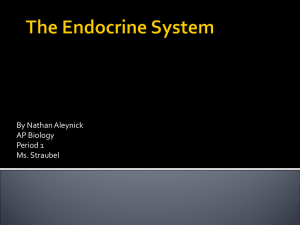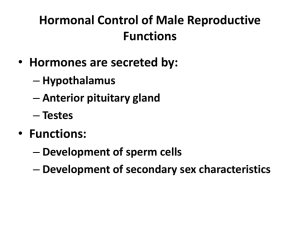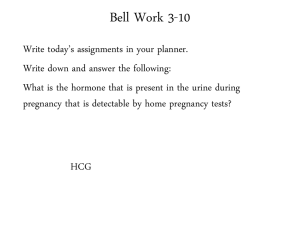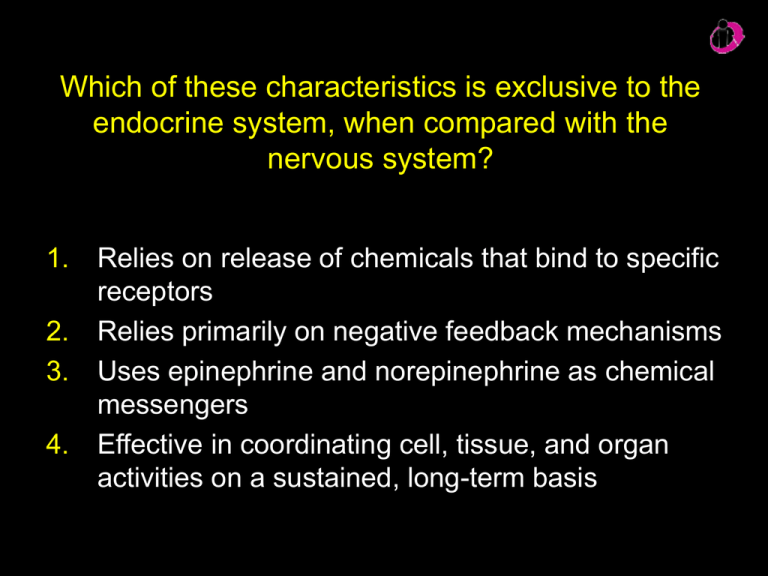
Which of these characteristics is exclusive to the
endocrine system, when compared with the
nervous system?
1.
2.
3.
4.
Relies on release of chemicals that bind to specific
receptors
Relies primarily on negative feedback mechanisms
Uses epinephrine and norepinephrine as chemical
messengers
Effective in coordinating cell, tissue, and organ
activities on a sustained, long-term basis
Which of the following statements is true of
peptide hormones?
1.
2.
3.
4.
They are derived from cholesterol.
They are synthesized as prohormones and convert
to active hormones before or after secretion.
They are also called biogenic amines and are
synthesized from tyrosine.
They are important paracrine factors that
coordinate cellular activities.
If levels of a certain hormone are high, which of
the following will happen?
1.
2.
3.
4.
A second messenger brings more of that hormone into
the cell.
There will be a decrease in the number of cell
receptors for that hormone and cells become less
sensitive to it.
A G protein will bind to that hormone.
There will be an increase in the number of cell
receptors for that hormone and cells become more
sensitive to it.
How does the presence of a molecule that blocks
adenylate cyclase affect the activity of a hormone
that produces its cellular effects by way of the
second messenger cAMP?
1.
2.
3.
4.
It prevents synthesis of the hormone.
It enhances the action of the hormone.
It increases sensitivity to the hormone.
It decreases speed of hormonal changes.
How does the hypothalamus regulate nervous and
endocrine activities?
1.
2.
3.
4.
It secretes regulatory hormones that influence
endocrine cells in the pituitary.
It has autonomic centers that exert direct neural
control over endocrine cells of the adrenal
medullae.
Hypothalamic neurons synthesize hormones and
transport them along axons within the infundibulum.
All of these are correct.
What is critically important about the vascular
arrangement of the hypophyseal portal system?
1.
2.
3.
4.
It provides efficient means of ensuring that all
hypothalamic hormones will reach target cells in the
adenohypophysis before being diluted in general
circulation.
It ensures that all hormones destined for the pituitary are
diluted in general circulation before entering the
adenohypophysis.
It ensures that RH from the hypothalamus synthesizes
the correct amount of a specific hormone.
None of these is correct.
Why do high levels of cortisol, a steroid hormone
from the suprarenal cortex, cause a decrease in the
pituitary secretion of ACTH?
1. Because high levels of cortisol stimulates
other steroid hormones.
2. The hormones act in a synergistic manner.
3. Because ACTH participates in a negative
feedback loop with cortisol.
4. CRH from the hypothalamus inhibits ACTH
release.
A blood sample shows elevated levels of
somatomedins. Which pituitary hormone will be
elevated as well?
1.
2.
3.
4.
Thyroid stimulating hormone
Growth hormone
Oxytocin
Adrenocorticotropic hormone
What is the role of FSH in males?
1. It stimulates production of sex hormones.
2. It stimulates the breakdown of stored
triglycerides by adipocytes.
3. It stimulates sustenacular cells, which then
promotes maturation of sperm.
4. It stimulates smooth muscle contraction in
the ductus deferens and prostate gland.
If a person has been drinking alcohol, how is ADH
released by the neurohypophysis affected?
1. More ADH is released to increase the solute
concentration of blood and urine.
2. ADH secretion is inhibited by drinking
alcohol.
3. It does not change at all.
4. ADH secretion increases causes
vasoconstriction and increased blood
pressure.
Iodine deficiency in the diet produces what
symptom?
1.
2.
3.
4.
Increased rate of metabolism
Increased body temperature
Exaggerated response to physiological stress
Goiter
Which of the following is not an effect of thyroid
hormones on major organ systems?
1.
2.
3.
4.
Increased heart rate and force of contraction
Increased sensitivity to sympathetic stimulation
Decreased turnover of minerals in bone
Stimulation of red blood cell formation
The removal of the parathyroid glands result
in a decrease in the blood concentration of
which important mineral?
1.
2.
3.
4.
Calcium ions
Phosphate ions
Sodium ions
Potassium ions
Failure of the zona glomerulosa to secrete
aldosterone would result in _____.
1. Decreased formation and secretion of calcitrol
2. Enhanced reabsorption of Ca2+ at the kidneys
3. Loss of Na+, K+ retention, and decreased
reabsorption of water at the kidneys
4. None of these is correct
Secretion of cortisol by the zona fasciculata
_____ in the liver and has a(n) _______ effect
on CRH in the hypothalamus?
1.
2.
3.
4.
Decreases glucose synthesis/stimulatory
Increases glucose synthesis/inhibitory
Increases androgen production/antagonistic
Decreases glycogen synthesis/synergistic
In what ways are hormonal effects of E and NE
from the suprarenal medulla similar to the effects of
glucocorticoids from the zona fasciculata?
1.
2.
3.
4.
Hormones from both are under the ultimate control
of the sympathetic nervous system.
Both increase cardiac activity and blood pressure.
Both are stimulated by angiotensin II.
Both increase blood glucose levels and promote
the breakdown of stored fats into fatty acids.
Increased amounts of sunlight inhibit the
production of which hormone?
1.
2.
3.
4.
Prolactin
Melanocyte stimulating hormone
Aldosterone
Melatonin
Melatonin is well known for its role in regulating
circadian rhythm. What are two other functions
of melatonin?
1.
2.
3.
4.
Promotes muscle mass and supports libido in
females
Testicular feminization and gynecomastia in males
Inhibits reproductive functions and protects CNS
neurons from free radicals
Promotes early puberty and increased rates of
oxygen consumption
Which pancreatic cell type is paired with the
hormone it produces?
1.
2.
3.
4.
Alpha cells/pancreatic polypeptide
F cells/a hormone identical to growth hormoneinhibiting hormone
Beta cells/insulin
Delta cells/glucagon
Cells in the ___are insulin independent, which
means that they can _____.
1.
2.
3.
4.
Brain, kidneys, and digestive tract/absorb glucose
without insulin stimulation
Liver/produce glucose
Pancreas and suprarenal cortex/produce insulin
Suprarenal cortex and suprarenal
medulla/function without insulin
Why are diabetics continuously thirsty and why do
they frequently urinate?
1.
2.
3.
4.
Less water is reclaimed by osmosis in the kidneys.
Water loss reduces blood volume, promoting
secretion of ADH.
Glucose is lost in the urine, which increases blood
volume.
1 and 2 are correct.
Which of the following is an effect of glucagon?
1.
2.
3.
4.
Accelerated glucose uptake and utilization
Breakdown of triglycerides in adipose tissue
Stimulation of amino acid absorption and protein
synthesis
Stimulation of glycogen formation
What is the effect of renin secretion by the
kidneys?
1. Stimulation of Ca2+ and PO4 absorption along
the digestive tract
2. Stimulates the production of red blood cells
by bone marrow
3. Converts angiotensinogen to angiotensin I
4. Inhibits secretion of ADH and aldosterone
Insulin lowers the level of glucose in the blood, and
then glucagon causes glucose levels to rise. What
is this type of hormonal interaction called?
1.
2.
3.
4.
Synergistic
Permissive
Antagonistic
Integrative
Deficiencies of which hormones impede normal
skeletal development?
1. GH, thyroid hormone, PTH, and reproductive
hormones
2. Prolactin, FSH, LH, GH
3. Thyroid hormone, melatonin, PTH, calcitonin
4. GH, TSH, ACTH, FSH
All of the following except ___ occur during the
resistance phase of the general adaptation
syndrome.
1. Conservation of glucose for neural tissues
2. Mobilization of remaining lipid and protein
reserves
3. Conservation of Na+ and loss of K+ and H+
4. Increased mental alertness and increased
blood pressure

